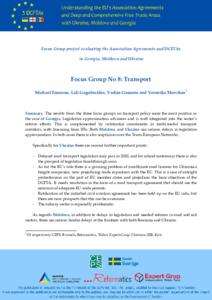
Focus Group No.8 – Transport
The results from the three focus groups on transport policy were the most positive in the case of Georgia. Legislative approximation advances and is well integrated into the sector’s reform efforts. This is complemented by substantial investments in multi-modal transport corridors, with financing from IFIs. Both Moldova and Ukraine see serious delays in legislative approximation. In both cases there is also scepticism over the Trans-European Networks.
Specifically for Ukraine there are several further important points:
-
Delayed road transport legislation may pass in 2020, and for inland waterways there is also the prospect of legislative breakthrough soon.
-
As for the EU’s role there is a growing problem of insufficient road licenses for Ukrainian freight companies, now prejudicing trade expansion with the EU. This is a case of outright protectionism on the part of EU member states and prejudices the basic objectives of the DCFTA. It needs resolution in the form of a road transport agreement that should see the emission of adequate EU-wide permits.
-
Ratification of the initialled civil aviation agreement has been held up on the EU side, but there are now prospects that this can be overcome.
-
The railway sector is especially problematic.
As regards Moldova, in addition to delays in legislation and needed reforms in road and rail sectors, there are serious border delays at the frontiers with both Romania and Ukraine.